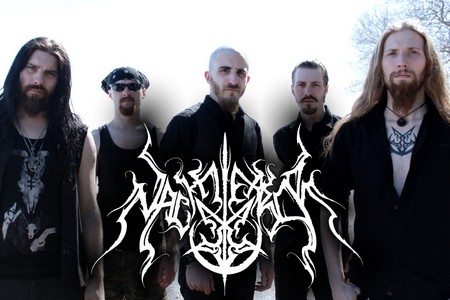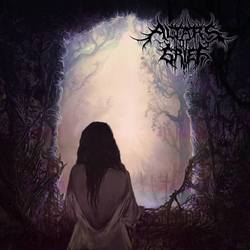Altars of Grief
Dead Rhetoric: You describe yourselves as “Prairie Doom” on Facebook. Could you elaborate on this?
Damien Smith: What’s more abysmal than the solitude of an 8 month winter? Endless skies, violent storms, frigid temperatures and desolation; put simply, we’re inspired by our surroundings and our music is a reflection of that!
Dead Rhetoric: Who are some of the band’s biggest influences?
Smith: I think that everybody in this band draws from a different well of musical inspiration, which lends a unique flavor to what we do. I’m a fan of hardcore and sludge and I feel like those genres in particular have had a lot to do with not only my vocal style, but my approach to writing, as well. Furthermore, some of the guys come from a technical death metal background and elements of that still find their way, to some extent, into our music.
That being said, there are a lot of bands that we all agree on that have been influential to what we create: Woods of Ypres, My Dying Bride, Celtic Frost/Triptykon and Abandon to name a few.
Dead Rhetoric: How do you feel your songs on the split compare to This Shameful Burden?
Smith: Musically, the songs on the split are quite a bit more diverse than what we had done previously on This Shameful Burden. They’re more melodic and there’s a lot more emphasis on clean singing and harmonies. To me, there’s a very melancholic quality to this music, whereas the first record felt more desperate, and crushing. What ties both releases together is an emotional commitment to everything we write. For us, this music is as much cathartic as it is a creative output.
Dead Rhetoric: There are track reflections for each song on This Shameful Burden. Can we expect the same once Of Ash and Dying Light is released?
Smith: More than likely, yes! The songs on the split, much like those on This Shameful Burden, follow a concept. And, much like This Shameful Burden, they hold some very personal significance to me. A lot of people seemed to really appreciate those write ups and I think it gives the songs another layer of depth for the listener to become more invested in.
Dead Rhetoric: Why did you choose to cover a song from Silent Hill 4: The Room?
Smith: A few of us in the band are huge fans of the Silent Hill franchise and of the games’ soundtracks, composed by Akira Yamaoka. The original song is a very beautiful and haunting piece of music, and we felt that we could recreate that atmosphere, with our own sound, and still do the original justice. When the idea came about to cover it, there was really no questioning that it would inevitably end up on the split. And, in a lot of ways, I feel like it really complements the tracks that we wrote.
Dead Rhetoric: Could you explain your side of the album art for Of Ash and Dying Light?
Smith: I’ll start by saying that there’s a fair amount of religious references in the lyrics that I wrote for these songs. And, I should clarify that this has nothing to do with my own personal beliefs, but it became a big part of the concept that I was writing.
Basically, there’s this little church in the middle of nowhere, about an hour from where I live. There’s a cemetery on the land, surrounded by a small fence. And, outside of that fence, completely secluded from all of the other graves is a single headstone. One day, we were speaking with the groundskeeper, who explained that this person had committed suicide and that’s why their grave was kept away from everyone else’s. Whether true, or not, this and the entire stigma attached to suicide and whether one can be accepted into Heaven if they take their own life were very significant factors while writing these songs.
So, the album art, as I see it, is someone looking on from purgatory at the place where they, or perhaps their loved ones were buried, with the knowledge that they’ve been condemned to this state.
Dead Rhetoric: How did you end up signing with Hypnotic Dirge Records?
Smith: I think it was probably leading up to, or around the release of This Shameful Burden that we first started discussing distribution and the potential for future releases with HDR. However, we’d been aware of them for some time prior.
The label is actually based out of Saskatoon which, conveniently, is just a few hours of north of here. It’s interesting to note, actually, that Of Ash And Dying Light is one of, if not their first local release!
Dead Rhetoric: Why do you feel that listening to doom metal brings about catharsis for some?
Smith: It’s diverse and emotionally compelling music! It’s trudging, melodic, introspective, and at times I think it deals with a lot of real-life subject matter that people can relate to.
Dead Rhetoric: How would you describe the metal scene of Saskatchewan?
Smith: There are a lot of people here who buy a ticket to every show that they can, regardless of what band is playing, just to show their support. And, it’s not just big shows, either, but local shows as well! We feel incredibly lucky to have as many people here who give a damn about us as we do; people who know my lyrics better than I do and who buy up every new merch design that we get!
We might not have a large population, but the scene definitely means a lot to people!
Dead Rhetoric: What will Altars of Grief be doing for the rest of this year?
Smith: Coming up in just a couple of weeks here, we’ll be doing the Of Ash And Dying Light tour with Nachtterror. Then, later this year, we’re heading out to Victoria, BC, where This Shameful Burden has been nominated for a WCMA for best hard rock/metal album!



